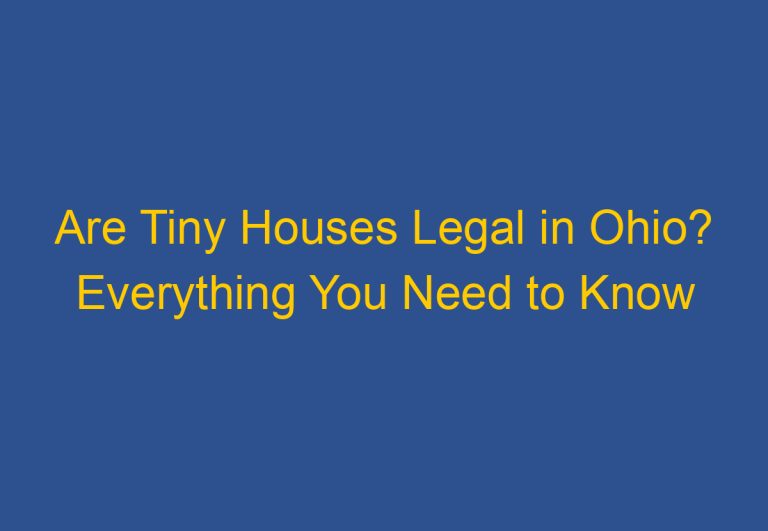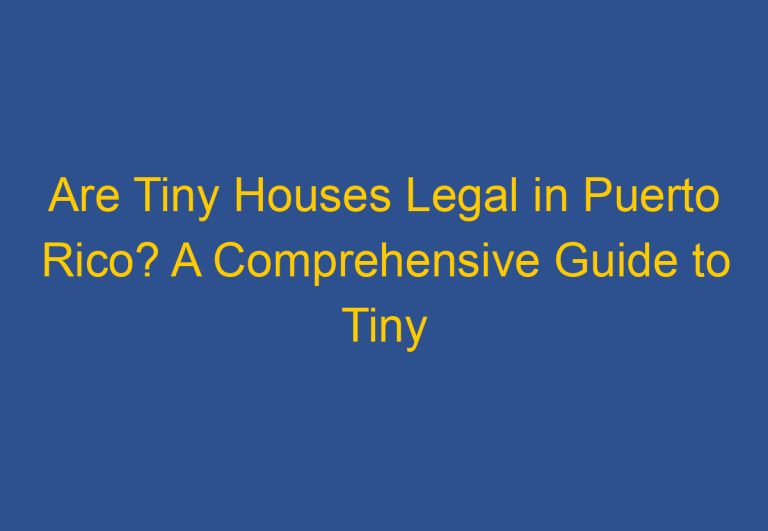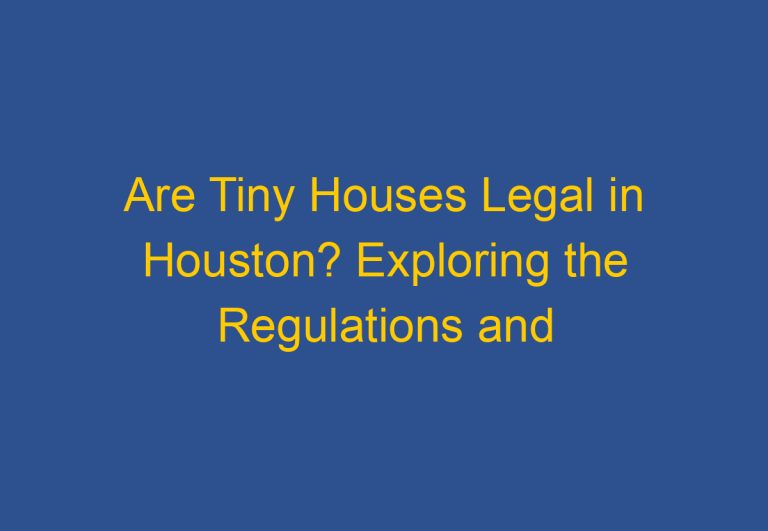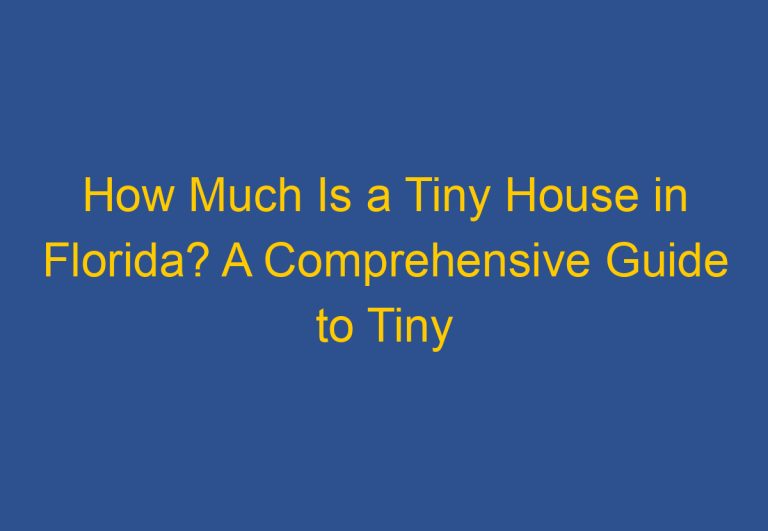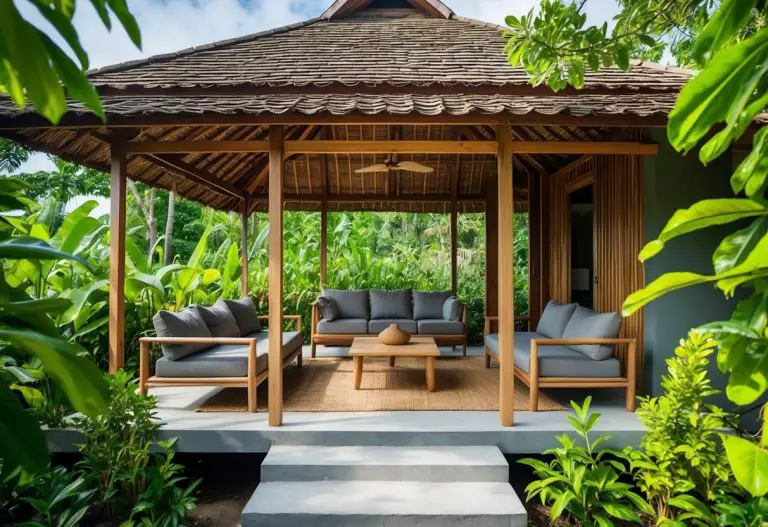Are Tiny Houses Legal in Spain? A Clear Answer to Your Question
Tiny houses have become increasingly popular in recent years, offering a simpler and more sustainable way of living. However, many people wonder if tiny houses are legal in Spain. The answer is not straightforward, as there are several legal considerations to take into account.
One of the key legal requirements for tiny houses in Spain is obtaining a micro-dwelling permit. This permit is necessary before constructing and living in a tiny house. It is important to note that the process of obtaining a micro-dwelling permit can be complex and time-consuming, as it involves complying with a series of legal requirements and regulations. Additionally, the regulations surrounding tiny houses in Spain can be confusing and often lack clarity, making it difficult to determine what is and is not allowed.
Despite the challenges, there are several companies in Spain that offer tiny houses for sale, including those with and without wheels, as well as modular and portable houses. It is important for anyone interested in living in a tiny house in Spain to do their research and ensure they are complying with all legal requirements. This article will provide a comprehensive guide to the legal considerations and regulations surrounding tiny houses in Spain, helping readers to make informed decisions about whether a tiny house is the right choice for them.
Legality and Regulations of Tiny Houses in Spain
Building Codes and Zoning Laws
Tiny houses in Spain are subject to the same building codes and zoning laws as traditional houses. The Technical Building Code (CTE) and the Organic Law of Building Management (LOE) regulate the construction of prefabricated houses, including tiny houses. These regulations cover aspects such as safety, structural stability, and energy efficiency.
When it comes to zoning laws, the regulations can vary depending on the municipality where the tiny house is located. However, in general, tiny houses are not considered legal dwellings in Spain, and they cannot be used as a permanent residence. This means that they cannot be placed on land designated for agricultural or forestry use.
Planning Permission and Building Permits
To build a tiny house in Spain, you will need to obtain planning permission and a building permit from the relevant authorities. The process can be complicated, and the requirements can vary depending on the municipality where the tiny house is located. It is essential to consult with a local architect or builder who is familiar with the regulations in your area.
The building permit application will need to include detailed plans of the proposed tiny house, including the materials to be used, the dimensions of the structure, and the location on the property. The authorities will review the plans to ensure that they comply with the relevant regulations.
Municipality-Specific Requirements
In addition to the national building codes and zoning laws, each municipality in Spain can have its own specific requirements for tiny houses. For example, some municipalities may require that tiny houses be connected to the local water and sewage system, while others may require that they have a certain minimum size.
It is essential to research the specific regulations in your area before starting the process of building a tiny house. Failure to comply with the regulations can result in fines or even the demolition of the tiny house.
In conclusion, while tiny houses are not currently recognized as legal dwellings in Spain, it is possible to build one with the necessary permits and planning permission. It is essential to consult with a local expert who is familiar with the regulations in your area to ensure that you comply with all the necessary requirements.
Design and Construction Considerations
Sustainability and Eco-Friendly Materials
When designing and building a tiny house in Spain, it is important to consider sustainability and eco-friendly materials. This means using materials that have a low environmental impact, are renewable, and have a long lifespan. Additionally, the use of materials that can be recycled or repurposed at the end of their life cycle is encouraged.
Some eco-friendly building materials that can be used in the construction of tiny houses include bamboo, straw bales, and recycled materials such as reclaimed wood. These materials have a low environmental impact and can help reduce the carbon footprint of the tiny house.
Mobility and Size Restrictions
One of the advantages of tiny houses is their mobility. However, in Spain, there are size restrictions for mobile homes. The maximum size for a mobile home is 40 square meters, which includes the living space and any outdoor areas. This means that a tiny house on wheels must be designed and constructed within these size limitations.
Additionally, when designing a tiny house, it is important to consider the weight and height restrictions for transportation on Spanish roads. The tiny house must be designed and constructed to meet these requirements.
Utility Connections and Off-Grid Capabilities
When designing and building a tiny house in Spain, it is important to consider utility connections and off-grid capabilities. The tiny house must be designed to connect to the necessary utilities such as water, electricity, and sewage.
However, for those who prefer off-grid living, it is possible to design and construct a tiny house that is self-sufficient. This means using solar panels for electricity, a composting toilet for sewage, and a rainwater harvesting system for water.
In conclusion, when designing and building a tiny house in Spain, it is important to consider sustainability, size limitations, and utility connections. By using eco-friendly materials, designing within size limitations, and considering off-grid capabilities, it is possible to create a functional and environmentally friendly tiny home.
Frequently Asked Questions
What are the zoning regulations for tiny houses in Spain?
Zoning regulations for tiny houses in Spain vary depending on the region and municipality. In general, tiny houses are not recognized as a separate category of housing, and therefore, they are subject to the same regulations as traditional houses. This means that zoning laws and building codes must be followed, and permits must be obtained before construction can begin.
Can you legally reside in a tiny house in Spain year-round?
Yes, it is possible to reside in a tiny house in Spain year-round, but it must comply with the same regulations as traditional houses. This means that the house must meet building codes and standards, and permits must be obtained. Additionally, the house must be connected to the necessary utilities, such as water and electricity.
What are the building codes and standards for constructing a tiny house in Spain?
Building codes and standards for constructing a tiny house in Spain are the same as those for traditional houses. This means that the house must meet minimum size requirements, have a foundation, and meet safety standards for electrical and plumbing systems. It is important to consult with local authorities before beginning construction to ensure compliance with all regulations.
Is it possible to establish a tiny house community legally in Spain?
Establishing a tiny house community legally in Spain can be challenging due to the lack of recognition of tiny houses as a separate category of housing. However, it is possible to establish a community if the houses comply with all zoning and building regulations. It is important to consult with local authorities to ensure compliance with all regulations.
Are there specific regions in Spain where tiny houses are more accepted?
There are no specific regions in Spain where tiny houses are more accepted than others. However, some regions may have more lenient zoning and building regulations, making it easier to establish a tiny house community or build a tiny house.
How do tiny houses on wheels fit into Spanish housing laws?
Tiny houses on wheels are not recognized as a separate category of housing in Spain. Therefore, they must comply with the same regulations as traditional houses. This means that they must meet minimum size requirements, have a foundation, and meet safety standards for electrical and plumbing systems. Additionally, they must be connected to the necessary utilities, such as water and electricity. It is important to consult with local authorities to ensure compliance with all regulations.





